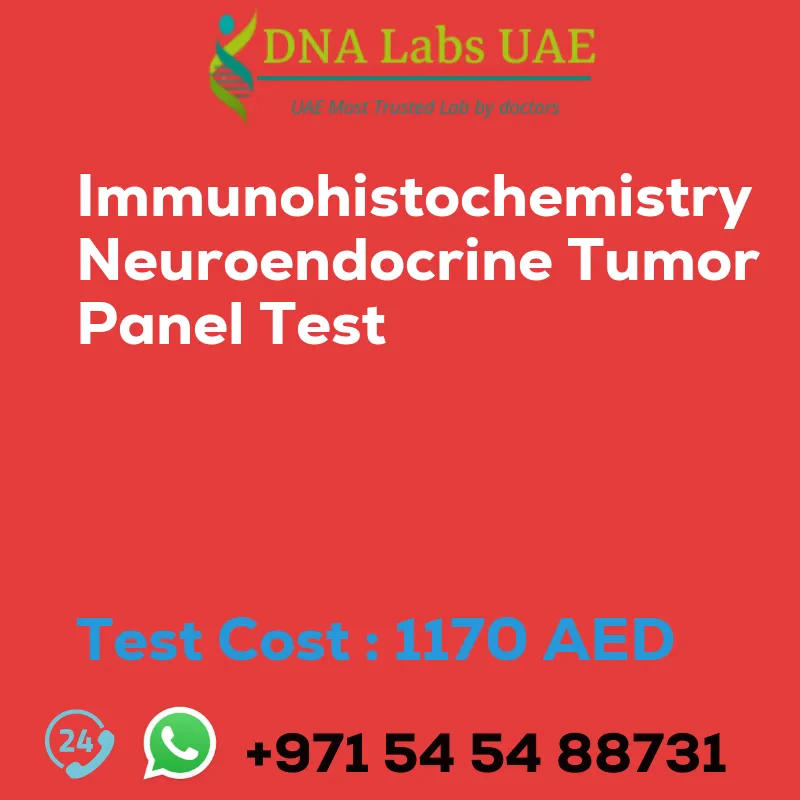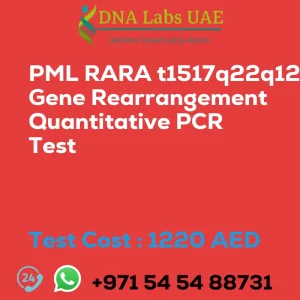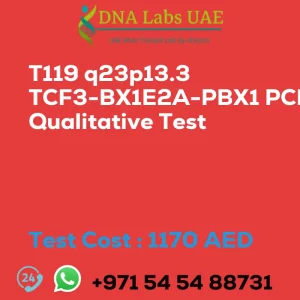IMMUNOHISTOCHEMISTRY NEUROENDOCRINE TUMOR PANEL Test
Test Cost: AED 1170.0
Introduction
The immunohistochemistry neuroendocrine tumor panel test is a diagnostic tool used to identify and classify neuroendocrine tumors (NETs) in tissue samples. Neuroendocrine tumors are rare and heterogeneous tumors that arise from neuroendocrine cells, which are found throughout the body and produce hormones. This blog post will provide detailed information about the test, including its components, price, sample condition, report delivery, method, test type, doctor, test department, pre-test information, and test details.
Test Components
- CDX2
- Chromogranin
- Ki67
- PAX8
- Synaptophysin
- TTF1
Price
AED 1170.0
Sample Condition
Submit tumor tissue in 10% Formal-saline OR Formalin fixed paraffin embedded block. Ship at room temperature. Provide a copy of the Histopathology report, Site of biopsy, and Clinical history.
Report Delivery
- Sample: Daily by 6 pm
- Report Block: 5 days
- Tissue Biopsy: 5 days
- Tissue large complex: 7 days
Method
Immunohistochemistry
Test Type
Cancer
Doctor
Oncologist, Pathologist
Test Department
HISTOLOGY
Pre Test Information
Provide a copy of the Histopathology report, Site of biopsy, and Clinical history.
Test Details
The immunohistochemistry neuroendocrine tumor panel test is a diagnostic tool used to identify and classify neuroendocrine tumors (NETs) in tissue samples. Neuroendocrine tumors are a group of rare and heterogeneous tumors that arise from neuroendocrine cells, which are found throughout the body and produce hormones. These tumors can occur in various organs, including the lungs, pancreas, gastrointestinal tract, and others.
The immunohistochemistry neuroendocrine tumor panel test involves staining tissue samples with specific antibodies that target proteins commonly expressed in neuroendocrine tumors. These antibodies can help identify and differentiate different types of NETs based on their protein expression patterns. The panel typically includes antibodies against markers such as chromogranin A, synaptophysin, CD56, and neuron-specific enolase (NSE). These markers are commonly expressed in neuroendocrine cells and can help confirm the diagnosis of a neuroendocrine tumor.
The test is performed on tissue samples obtained through a biopsy or surgical resection. The tissue is fixed, processed, and embedded in paraffin, and thin sections are cut for staining. The sections are then incubated with the specific antibodies, and the bound antibodies are visualized using a colorimetric or fluorescent detection system.
The results of the immunohistochemistry neuroendocrine tumor panel test can provide valuable information for the diagnosis, classification, and management of neuroendocrine tumors. It can help differentiate NETs from other types of tumors and determine the origin and grade of the tumor. This information is crucial for guiding treatment decisions and predicting patient outcomes.
| Test Name | IMMUNOHISTOCHEMISTRY NEUROENDOCRINE TUMOR PANEL Test |
|---|---|
| Components | *CDX2*Chromogranin*Ki67*PAX8 *Synaptophysin*TTF1 |
| Price | 1170.0 AED |
| Sample Condition | Submit tumor tissue in 10% Formal-saline OR Formalin fixed paraffin embedded block. Ship at room temperature. Provide a copy of the Histopathology report, Site of biopsy and Clinical history. |
| Report Delivery | Sample Daily by 6 pm; Report Block: 5 days Tissue Biopsy: 5 days Tissue large complex : 7 days |
| Method | Immunohistochemistry |
| Test type | Cancer |
| Doctor | Oncologist, Pathologist |
| Test Department: | HISTOLOGY |
| Pre Test Information | Provide a copy of the Histopathology report, Site of biopsy and Clinical history. |
| Test Details |
The immunohistochemistry neuroendocrine tumor panel test is a diagnostic tool used to identify and classify neuroendocrine tumors (NETs) in tissue samples. Neuroendocrine tumors are a group of rare and heterogeneous tumors that arise from neuroendocrine cells, which are found throughout the body and produce hormones. These tumors can occur in various organs, including the lungs, pancreas, gastrointestinal tract, and others. The immunohistochemistry neuroendocrine tumor panel test involves staining tissue samples with specific antibodies that target proteins commonly expressed in neuroendocrine tumors. These antibodies can help identify and differentiate different types of NETs based on their protein expression patterns. The panel typically includes antibodies against markers such as chromogranin A, synaptophysin, CD56, and neuron-specific enolase (NSE). These markers are commonly expressed in neuroendocrine cells and can help confirm the diagnosis of a neuroendocrine tumor. The test is performed on tissue samples obtained through a biopsy or surgical resection. The tissue is fixed, processed, and embedded in paraffin, and thin sections are cut for staining. The sections are then incubated with the specific antibodies, and the bound antibodies are visualized using a colorimetric or fluorescent detection system. The results of the immunohistochemistry neuroendocrine tumor panel test can provide valuable information for the diagnosis, classification, and management of neuroendocrine tumors. It can help differentiate NETs from other types of tumors and determine the origin and grade of the tumor. This information is crucial for guiding treatment decisions and predicting patient outcomes. |








